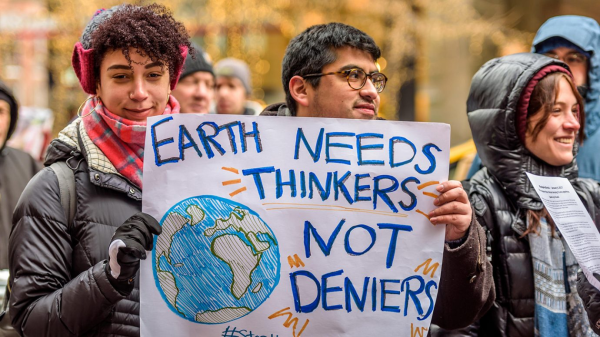A 2022 study1 by investigators from Yale and George Mason universities reported survey results after Americans were questioned about climate change. I suspect ignorance would be lower and expressions of concern would be higher in Canada since this country is not bombarded with reckless disinformation to the extent experienced by our neighbours.
Global Warming Beliefs
- Americans who think global warming is happening outnumber those who think it is not happening by a ratio of 6 to 1 (72% versus 12%). Those who are very or extremely sure global warming is happening outnumber those who are very or extremely sure it is not happening more than 7 to 1 (54% versus 7%).
- 56% of Americans understand that global warming is mostly human-caused, while 33% think it is due mostly to natural changes in the environment.
- 55% of Americans understand that most scientists think global warming is happening. However, only 20% understand how strong the level of consensus among scientists is (i.e., that more than 90% of climate scientists think human-caused global warming is happening).
Emotional Responses to Global Warming
- 64% of Americans say they are at least somewhat worried about global warming. 30% say they are very worried.
- 62% of Americans say they feel interested when thinking about global warming. 51% say they feel disgusted or sad. 46% say they feel afraid, 44% expressed anger and 42% were outraged (42%), while 38% say they feel hopeful.
Perceived Risks of Global Warming
- 48% of Americans think people in the U.S. are being harmed by global warming right now, and 43% say they have personally experienced the effects of global warming.
- 65% think global warming will harm people in the U.S., people in developing countries (69%), the world’s poor (69%), plant and animal species (72%), and future generations of people (72%).
Personal and Social Engagement with Global Warming
- 67% of Americans say they rarely or never discuss global warming with family and friends, while 33% say they do so occasionally or often.
- 56% say they hear about global warming in the media at least once a month. 24% say they hear people they know talk about global warming at least once a month.
- 64% say the issue of global warming is either extremely, very, or somewhat important to them personally, while 36% say it is either not too or not at all personally important.
- 40% say their family and friends make at least a moderate effort to reduce global warming. Similarly, 40% think it is at least moderately important to their family and friends that they take action.
Fatalism
- 61% of Americans believe that it is not too late to do anything about global warming.” 17% believe it is too late.
- 48% think new technologies can solve global warming without individuals having to make big changes to their lives. 52% disagree.
Impacts of global warming
- 63% of Americans think global warming is affecting weather in the U.S., including 32% who think weather is being affected “a lot.”
- Large majorities think global warming is affecting many environmental problems in the U.S. including extreme heat (75%), wildfires (73%), droughts (72%), rising sea levels (72%), flooding (70%), water shortages (70%). and air pollution (70%).
- More than six in ten think global warming is affecting hurricanes (69%), reduced snowpack (68%), tornados (67%), agricultural pests and diseases (65%), water pollution (63%), and electricity power outages (62%).
- About two in three (65%) agree either strongly (31%) or somewhat (34%) agree that wildfires have increased around the world because of global warming.
- 56% think extreme weather poses either a high (19%) or moderate (37%) risk to their community over the next 10 years.
- A majority are worried about harm from a range of environmental problems in their local area including electricity power outages (78%), water pollution (77%), air pollution (73%), extreme heat (71%), agricultural pests and diseases (70%), droughts (69%), water shortages (68%), flooding (61%), wildfires (61%), and tornados (60%).
The unfortunate thing is that despite growing scientific evidence, fundamental attitudes of Americans about climate change are largely unchanged over 14 years. However, the numbers prove that hesitancy of politicians and bureaucrats to address harmful emissions is because they fear reactions from wealthy industrialists and financiers, not voters.

1 Leiserowitz, A., Maibach, E., Rosenthal, S., Kotcher, J., Carman, J., Neyens, L., Myers, T.,
Goldberg, M., Campbell, E., Lacroix, K., & Marlon, J. (2022). Climate Change in the American Mind,
April 2022. Yale University and George Mason University. New Haven, CT: Yale Program on Climate
Change Communication.
If you find value in posts and dialogue at IN-SIGHTS.CA, please consider financial support. It is a simple process explained HERE.
Categories: Climate Change





1 reply »